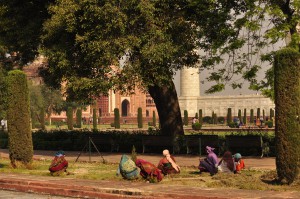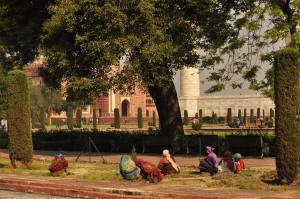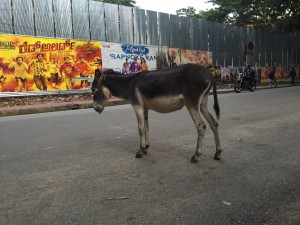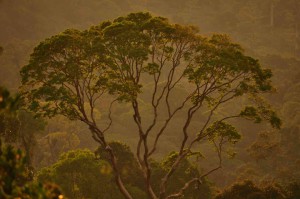
Note: Travelling is a poem by Eunice de Souza. I find it impossible to read a poem without layering it with my own memories. Here I read de Souza to explore privilege, gender divides and nostalgia, all of which I encountered while trying to figure out what exactly travelling was meant to be.
Elephanta, Feb 2013
I
We walk to the shrine of the diamond-eyed god
This is the hour he’s in green and gold
The women moan
He looks a little camp to me
upturned palm with rose
joss sticks burning
but oh the black granite thighs.
Ardhanareeswara (the composite androgynous form of the Hindu god Shiva and goddess Parvati) has beautiful black granite thighs; at least in Elephanta, where the sculptors are supposed to have worked in the 5th and 6th centuries A.D. carving this magnificent form out of dark rock. I stood before the sculpture, admiring the curves of the half male-half female body resting against the hump of a bull. A crowd gathered before it, everyone entranced by this perfect union of the male and the female. There was a guide, talking about ‘Indian culture’, explaining that ‘in India’ the male and the female are both divine, and in the body of the Ardhanareeswara, united and equal.
Offshore, equality is greatly contested. Before I boarded the boat at the Gateway of India, a friend called, asking me to be careful. “It’s isolated. Things happen,” she said, using euphemism for warning me about potential sexual harassment. I boarded the boat feeling a little conflicted — a part of me wanted to heed the warnings and stay on the main land in Mumbai; the other part of me knew that if I did not board that boat, I would just reinforce the basis for such fear.
Nothing happened, during that entire trip. I walked around the caves, with foreign tourists, Indian families, a groups of nuns; everyone ignored the other until a group of young monkeys began to make chirping noises. We all paused until they were gone, and then with a smile acknowledged each other shortly before we moved on. On my way back, I realised I had lost my ticket. The man, who was letting us onto the boat, waved me in anyhow. “I remember you,” he said, gesturing to the red highlights in my hair. The woman behind me glared at him admonishingly, and mumbled something about how ‘unnecessary’ such friendliness was.
As we pulled away from the shore, away from the lord who was part-woman and part-man, I couldn’t help but wonder if the gulf between men and women were widening in a search for dignity and respect. And really, weren’t we in the process straining the divide between the classes?
Borneo, May 2014
II
Green roses on a terrace
lemon, grass, golden moon
a golden oriole chases a crow
Mine host waxeth sentimental.
Not a love in sight.
A short conversation with a date in a bar in Boston: I told him I wanted to travel. He said, “Yes, you could be one of those women, who travels the world and then writes a book about it.”
I did travel. I saved up for it, worked jobs I did not love so I could go around the world. I watched the sun come up in Borneo. I watched the sun go down in Goa. I sat at a bar listening to Fado in Lisbon. I watched a performance of Kattaikutthu in a village near Kanchipuram. I watched a buffalo calf being sacrificed at a temple in Nepal.
Then one day I ran into a fellow traveller boasting about his exploits: I have done Kenya, he was saying. I have done Australia. I have done India. What gives us – me or him – the authority to wander and just ‘do’ these places? Isn’t there something irreverent about going to a place, taking the best it has to offer and turning it into a page in a scrap book, or an album on Facebook? About thinking that these places, these people exist for your self-fulfillment? About thinking that eating street food in Penang or Mumbai is to have made a contribution to ‘an economy’?
It makes you wonder if self-discovery is simply conquest in a new garb. It isn’t different just because a woman is able to do it.

III
The tattered balladeers invoke the
sun, the moon, the stars,
sing of kings who rode a night of sand
to plant a flag
on yet another sand dune,
of women who died when the sands shifted
in the wind.
A bulbul sings in the thorn tree
Too many people ask me what I think of the Taj, the moment I tell them I am from India. It is tiring to explain that all of India isn’t in the backyard of the Taj Mahal. So, I thought I might just as well bite the bullet, be the tourist and go see the Taj Mahal.
It is a beautiful building. It was a little after 7 a.m. when I was staring it in the face. It looked glorious in the golden light of the dawn and yet, it also looked tired. “What do you think?” my guide asked me. “I think it is okay,” I said. “That’s all you have to say about something built for love,” he asked. I shrugged.
“People lost their fingers building this,” he said, as walked up the platform of the Taj.
“Is that true?”
“Well, I think I can tell you the truth,” he said. “The truth is, no one knows.”
In the evening, I returned again because I wanted to see it when there was a crowd. I took the audio guide made by the Archaeological Society this time. They did not think Shah Jahan cut fingers to build the building.
As I walk around, I spot several people – mostly women – weeding the lawn and keeping the grounds. There is more to the labour that has gone into the making of this national monument than workers from Shah Jahan’s time. And yet, we never see them. Love, I guess, can be very blinding.
Cuddalore, December 2014
IV
Wedged between houses, a sliver of sea,
casuarinas, clean sand,
infinity.
That is a perfect description of the view from home. The sand isn’t exactly clean, but I’ve learned not to care. As a child, I liked to lie down in my bed and close my eyes. It was a small town and so the nights were quiet. I could hear the waves once the noise on the streets died down.
In 2004, after the Tsunami, my hometown made it to the cover of Time Magazine. A woman was sprawled across the sand crying. The photograph came up in a journalism class I took many years later. Was there an obligation to take these images, the professor asked? Was there an obligation to see them?
No one travels to a town like mine on a normal day. Yes there is a very nice beach, but it isn’t an interesting beach. But then when disaster strikes, everyone wants to see it. On the one hand, it is great for aid. On the other, was that a private moment that became public? Even if she was crying in a public place, was her act of mourning meant for all the world to see?

V
This town boasts a one-armed postal clerk
aways drunk
a dog named Dumpy who can’t stand the smell of drink
a street with three war widows and two light-eyed girls
who went astray
seven hen-pecked husbands
Copernicus who likes to treat his friends
and disappear when the bill appears…
Never underestimate a dishevelled town
the Colonel says
reaching for the rum.
Veena Stores in Malleswaram is a hole in the wall: a tiny kitchen with a counter at the front, where two men take down orders and give tokens as fast as they can. There is a staff of three, passing outidlis, pongal, vadai and paper cups with freshly brewed and poured frothy coffee. You can smell the fresh sambar as you wait for your number to be called. The food is, needless to say, fantastic.
My friend took me to Veena Stores when I was visiting her in Bangalore. After breakfast, we walked around Malleswaram, pausing to Instagram everything we thought was interesting: donkeys crossing roads, vegetable markets, a store advertising bras, tailoring stores, old doorways, graffiti, train tracks. This was the part of Bangalore that inspired R.K. Narayan to create Malgudi, and we feel like we are wandering through the pages of a book.
This is the thing about traveling – a place you’ve never been to before can evoke a sense of nostalgia. Malleswaram reminds me of childhood; it resembles Thirichirapalli, where I was born. Or maybe just Tirupapuliyur where I lived. Maybe it is just another Indian city, romantic because it stands in the shadows of ‘development’. We pause on the overhead bridge at the train station, and stare at the heart of Bangalore city – the skyscrapers, the aluminium and glass glinting in the sun. We would soon head back there, and into the tedium of our everyday lives.
But before we did, we decided to get ice cream. The store isn’t open and so we just hang out on the pavement. I’ve grown up watching men do this all the time. While I learned to be derisive of their wastefulness, I also felt envious of their ability to just hang around doing nothing. When the store opens I get the Sitaphal (sugar apple, also known as custard apple) flavour. It goes down in my memory as a sense of abandon.
All photographs courtesy the author.


